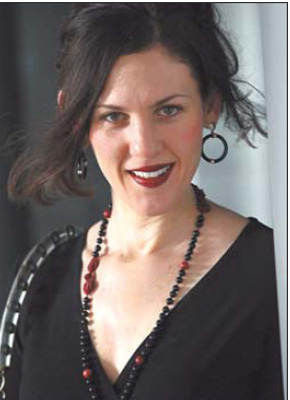|

|
|
American Rachel DeWoskin, author of Repeat After Me. [China Daily] |
Rachel DeWoskin's life has been a psychedelic romp compared to that of her protagonist, Aysha Silvermintz. But both Aysha, who appears in DeWoskin's debut novel Repeat After Me, and her creator start out as 22-year-old English language teachers to foreign students in New York.
Aysha, whose journey across continents (from New York to Beijing) and time (from 1989 to 2003) is the subject of DeWoskin's novel, can hardly match the extraordinary life of her gorgeous creator, who at 37 is long accustomed to being under public gaze.
DeWoskin came to Beijing in 1994 to be a public relations consultant, but went on to star in the hit TV series Foreign Babes in Beijing, playing the glamorous, bad American girl Jiexi, running after Chinese men. Her popularity soared, so much so that she would be recognized even in downtown New York, long after the serial went off air.
She turned her Chinese sojourn into a book named after the serial, picked up soon after by Paramount Pictures for a screen adaptation. In between, she finished a graduate course in poetry at Boston University, married playwright Zayd Dohrn and had two children.
Aysha, her protagonist, "is based only in very small parts on me". She is romantic, sensitive, and fragile.
The arrival of Da Ge, a deeply-troubled Chinese young man in Aysha's English class, changes her life forever. He is crass, stubborn, angry, possessive, reclusive, demanding and a bully but seems to have a disarmingly intuitive understanding of cultural nuances.
Aysha is irresistibly drawn toward Da Ge whose only interest in marrying her is to secure an American passport. They marry, make love - Aysha, aching with desire and Da Ge, not all there. And then, just about the time Aysha thinks of revealing her pregnancy, Da Ge is dead.
"In Da Ge I wanted to create a complement to Aysha, and between them a synthesis, which is manifest in Julia Too," says DeWoskin. Julia is the love child of the two protagonists, a sparkling pre-teen who ruminates on death as naturally as she demands her purple fruit roll-up.
"I got to relive my own childhood through her, and imagine what my girls (now aged 4 and 1) might be like when they reach the pre-adolescent stage. I want my daughters to have a lasting relationship with China, like Julia Too."
Da Ge's passage to America has a parallel in Aysha and Julia Too's arrival in Beijing in the early 1990s to trace their Chinese connection. The newly-entrepreneurial China and America face similar issues - an ever-widening income gap, reality TV and avian flu.
If Chinese TV abounds in stereotypes of American women as gold-diggers, like the character DeWoskin played in Foreign Babes, "when has anybody seen a nuanced Chinese character on American TV?"
In fact, "while China is very friendly toward foreigners, America, post 9/11, is not."
Her book also celebrates cultural differences.
"I love Chinglish," she says. "Although these are often grammatically inaccurate, they allow the speaker to import the most expressive components of the English language into Chinese culture."
As Da Ge writes in one of his several letters to Aysha, "I am float through the world like a bubble that will disappear any moment. No city. No family. No home."
Her interest in the way language works across cultures ties in with the themes of displacement, of being thrown out of one's linguistic comfort zone.
"When you remove yourself from the familiar markers, you have to keep figuring out who you are in a different context. Being in China helps me understand America's place in the world."
(China Daily August 4, 2009)